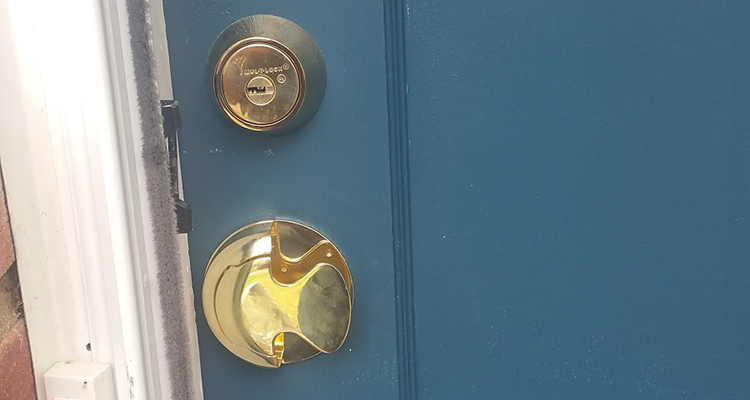A Locksmith, a Monkey and the Oldest Profession: On Disruption
 While I’m not attending InfoComm in meatspace this year, I’ve managed to flitter in and out of the show via Twitter, Periscope, Snapchat, etc. I’ll talk more about the experience of the trade show from afar, but today I’d like to discuss the keynote speech, a recent visit I made to my locksmith and what it means to be an AV professional.
While I’m not attending InfoComm in meatspace this year, I’ve managed to flitter in and out of the show via Twitter, Periscope, Snapchat, etc. I’ll talk more about the experience of the trade show from afar, but today I’d like to discuss the keynote speech, a recent visit I made to my locksmith and what it means to be an AV professional.
The keynote, by Stephen Dubner of Freakonomics fame, concluded with a story Dubner has told before, about economics research involving capuchin monkeys — not the world’s smartest monkeys, but monkeys with very clear desires and drives. This part of the story was read and paced as a joke, with a long set-up leading to a satisfying payoff in which the monkeys, having been taught the concept of money, discover the oldest profession as one innovative primate uses a coin to buy sex from another monkey. The “invention of monkey prostitution” is, I’m sure, the part of the story which most people would remember, but to me the more interesting bit of the story is the part which immediately preceded it; as part of the agreed-upon experimental protocol, the monkeys were only allowed to handle money in one-on-one meetings with the researchers in an experimental cage. During one of these sessions, a monkey grabbed the basket of coins and flung it into the communal cage. This forced the researchers to bribe the monkeys to get the coins back (monkey deflation?) and ultimately lead to the aforementioned monkey sex-trade.
Another story that this brought to mind is a recent visit I took to a locksmith. I’d just purchased a new storm door after taking careful measurements of the width of the current door opening, height of the opening and not measuring the location of the existing door handle. After removing the old door and handing the new one, installing hardware and squaring everything up I attempted to close the new door and… CRASH. The two door handles attempted to occupy the same space at the same time. After finding nothing of much use at the big-box home improvement store, I took a trip to the local locksmith, armed with the storm-door hardware and photos of the in-progress installation. The locksmith shook his head and informed me that there was nothing to do; I wasn’t the first person with that problem and there’s no solution. I asked about alternate handles for the storm door. About a lower-profile handle for the main door. He just kept shaking his head, repeating that he’s seen the issue many a time and that it is insolvable.
 So now I had a storm door with no inside handle and a guarantee that my problem had no answer. After fifteen minutes with Google, an online purchase and a quick DIY hardware swap, I had the problem solved with the installation of a low-profile door pull. Afterwards I took a moment to reflect on how my father would have handled this when I was young; the initial problem would be the same, as would the trip to the local home-improvement store and then the locksmith. After that, however, the path would reach a dead end; the knowledge of what is possible was hidden from common folk, only available to those with contacts within the industry. Two decades ago, I’d have simply had to replace the door.
So now I had a storm door with no inside handle and a guarantee that my problem had no answer. After fifteen minutes with Google, an online purchase and a quick DIY hardware swap, I had the problem solved with the installation of a low-profile door pull. Afterwards I took a moment to reflect on how my father would have handled this when I was young; the initial problem would be the same, as would the trip to the local home-improvement store and then the locksmith. After that, however, the path would reach a dead end; the knowledge of what is possible was hidden from common folk, only available to those with contacts within the industry. Two decades ago, I’d have simply had to replace the door.
What do these stories have in common? In both cases the initial model in which power — be it in the form of money or knowledge — comes from a small, controlled group is disrupted as that power is distributed through the greater population. If we want to look for and discuss disruptions in technology, this is the kind of moment for which we need to look — and these moments are appearing. Think about what the combination of low-cost MP3 players and wide adoption of broadband internet did to the music industry — suddenly everyone had a record store in his own home. You could purchase a single rather than an entire album, share purchases with thousands of people at a time through torrent sites, upload and trade your own content. Think of what online services such as ITTT could do to the lower-end of home automation or what software-based conferencing is doing to the commercial market. A user can now update her conferencing platform or even switch platforms without having to contact an AV integrator. She can often deploy software control, monitoring and even transport solutions without an AV professional. The monkeys have access to the basket of coins; the homeowners have the ability to Google low-profile door handles.
What does this mean about us as AV professionals? Are we in danger of being extinct? I don’t see that happening any time soon. At the end of the day, the monkey is still a monkey and the economist is still an economist. Even as the world changes — even as more of the monkeys gain access to more of the coins — there’s a role for those who make their life study the flow of coins, who can help find ways to optimize outcomes and to guide increasingly savvy monkeys towards the best possible results.
What we forget at our own peril is that we’re no longer the ones holding the basket. We can’t be like the locksmith who is asked a question, doesn’t know the answer, and keeps telling people that it isn’t possible. Had the locksmith looked for an answer to the “screen door won’t close” question the first time someone asked him he’d have had an answer for me, and would still have been positioned as an expert. Perhaps he’d not have had the needed item in stock. Perhaps he’d bring it up only to reject it for some reason he didn’t think it a good choice. Or perhaps he’d have sent me elsewhere for it. Either way he could have (even in a disruptive world in which the monkeys hold the basket) added some value.
I will revisit some of this in the future. For the nonce, when you look at a new piece of technology or new innovation ask yourself if it gives the coin basket to the monkeys.





